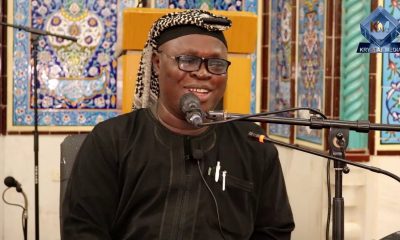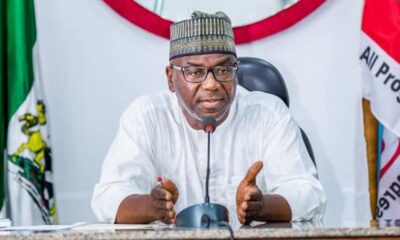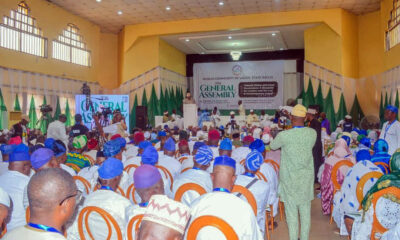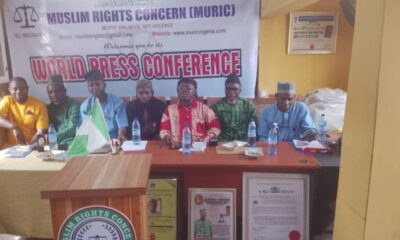Opinion
Names for pig and pig meat in English Muslims should know – Farooq Kperogi

Names for pig and pig meat in English Muslims should know – Farooq Kperogi
In the spirit of Ramadan, I am republishing a revised version of an article I wrote in June 2017 in my defunct “Politics of Grammar” column about pig-based meats and foods that Muslims are forbidden from eating but which many of them who visit the West unwittingly eat on occasion because of their poly-appellativeness (my coinage for multiple names.)
The column was inspired by an encounter I had in 2015. A Muslim high court judge from Osun State nearly ate pepperoni pizza (pepperoni is a mixture of beef and pork) at a workshop for Nigerian judges that I facilitated here in the United States. I knew he was an observant Muslim because we’d prayed together, and he’d shared concerns about the ubiquity of pork in Western culinary choices.
During lunch break, I saw him with slices of pepperoni pizza amid several people. I beckoned to him to come immediately, but he was really hungry, so he said I should give him a few minutes to finish his food.
I know enough Yoruba to know that pig is called “alede” and eat is “je.” I combined the words to make a sentence that I didn’t think made much sense. He jumped out of his seat instinctively and asked me in English if what he was about to eat contained pork. I answered in the affirmative.
He went straight to the bathroom and vomited, even though he hadn’t eaten anything. I felt sorry for him. He refused to eat or drink anything thereafter.
Another inspiration for this column derives from the tales of distress and guilt I’ve heard from many Muslim visitors to the West who consumed pig meat or who were awfully close to doing so out of ignorance of the deceptive appellative trappings of many pork-based gastronomic products.
For instance, at least five Muslims have told me that they either ate or almost ate a pig-based meat product called “salami” because they were deceived by the lexical similarities between “salami” and “salam” (Arabic for “peace”) and were misled into thinking they were eating halal meat.
READ ALSO:
- Olubadan: Balogun buried, Ladoja pays homage to incoming monarch, Olakulehin
- NEMA gets Zubaida Umar as new DG
- Naira sells N1,600/$ at parallel market, N1,602.75/$ @official window
What could be more halal, they thought, than a meat that shares lexical and phonological similarities with “salam,” the short form of the Muslim, Arabic-derived greeting, As-salamu alaykum, and the root word of Islam itself?
In fact, many African Muslims bear the name Salami as the short form of Abdulsalam or “Abdus Salam (which stands for servant of the Peaceful, “salam” being one of the 99 names of Allah.) (Africans typically add a terminal vowel to every word or name. Thus, “Salam” becomes “Salami.”)
So how did pig meat come to share lexical similarities with the name of Allah and/or the short form of the most common greeting among Muslims, especially given that pork is prohibited in Islam?
A northern Nigerian Muslim who ate salami in London in ignorance told me he was sure that the choice of the name was a deliberate “Zionist plot to make Muslims eat pork.” That’s not true. First, Jews, like Muslims, are forbidden from eating pork. Second, the phonemic similarity between “salami” to “salaam” is actually accidental.
Salami is salted Italian pork sausage (more about this later.) “Salami” is derived from the Latin name for salt, which is “sal.” The Italian suffix “ame” is used to form collective nouns. For example, foglia, which means “leaf,” becomes fogliame when used as a collective noun. So salame actually literally means “salts,” but specifically salted meats. (“Salami” is the plural form of salame). The association of salami with salted pork came later.
Interestingly, this pork-based meat is called “salam” in Romanian, Bulgarian, and Turkish!
Well, there are few animals in the English language that trump “pig” in abundance of alternative names for it.
This includes names that indicate gender (such as “boar” for male pig and “sow” and “gilt” for female pig) and names that indicate age (such as “piglet,” “farrow,” or “shoat/shote” for young pigs).
A pig is also called a “hog,” a “swine,” a “grunter,” a “squealer,” a “sus scrofa,” a “porker,” and a “cobb roller.”
Most people know “pork” as the culinary noun for meat from pig, but there are way more pig-based foods and meats than “pork” that several people, especially Muslims who are prohibited from eating pork, are not familiar with. I list 14 more below as a public service.
1. “Bacon”: This is usually served during breakfast at homes and in hotels—along with eggs and sausage. It’s thin, sliced, salted, fried and brownish pork. It’s one of the most traditional culinary treats in the West. It’s so central to the gastronomy of the West that it appears in idioms such as “bring home the bacon,” which means to be the breadwinner, to be responsible for one’s family’s material wellbeing.
Most people know that bacon is derived from pig, but I have met many Muslim visitors to America, especially from Nigeria, who don’t know this. It’s also less commonly called “flitch.”
2. “Banger”: This is chiefly British English. Banger is pork cut into tiny pieces, seasoned, and stuffed in casings. The usual name for this elsewhere is “sausage” (see 3 below). It appears in collocations such as “banger and beans,” “bangers and mash,” etc.
READ ALSO:
- No approvals from FEC for borrowing through eurobond, says DMO
- Man charged to court for threatening mother with gun, stealing N625,000
- Police nab armed robber posing like mad man to kidnap, rob victims
3. “Bratwurst (or just brat)”: Just like “banger” is chiefly British, “bratwurst” is mostly German. It’s a popular German pork sausage, although it’s often mixed with beef. In America bratwursts are called “brats.” (Sausage is any type of minced meat, mostly pork, that is seasoned and stuffed in casings).
4. “Chitlings” or “chitlins” or “chitterlings”: It is the intestines of a pig, which American blacks ate as food during slavery because it was one of the few sources of protein available to them.
Several decades after slavery, chitlins (also spelled chitlings and chitterlings) are still an African-American delicacy. If you are a Muslim who wants to experience African-American culinary delights, often called “soul food,” be sure to avoid “chitlings.” It’s just a cute word for the intestines of pigs.
5. “Chops” or “pork chops”: I know “chop” means “eat” in West African Pidgin English. But in Standard English it can mean a small cut of meat. It usually, though, is a small cut of meat from cooked pig. That’s why the usual phrase is pork chops, but it is also frequently rendered as “chops,” and that’s where people unfamiliar with the culinary vocabularies of the West might be misled into thinking they are eating a small cut of beef or mutton, etc.
6. “Frank” or “Frankfurter”: This is a type of smooth, minced, smoked pork often served in a bread roll. It is sometimes made of beef or a mixture of beef and pork. It’s generally called “hot dog,” especially in American English, and it’s so named because some people suspected, without any proof, that in Germany, where it was invented in the city of Frankfurt, dog meat was surreptitiously inserted into the meat since Germans ate dogs up until the 20th century.
Other names for franks or Frankfurters are “dog,” “weenie,” “wiener,” “wienie,” and “wienerwurst.” Although hot dogs or Franks started in Germany, they have become a staple of American street cuisine.
Thankfully, there are now turkey hot dogs, beef hot dogs, and chicken hot dogs, but the most popular ones are the pork-based ones. It’s always good to ask before you buy.
7. “Gammon”: This is pork taken from the thighs of a pig. It’s derived from the Latin word “gamba,” which means leg. It’s also called jambon or, more commonly, ham.
8. “Kielbasa”: This is the Polish word for pork-based sausage, which has achieved widespread acceptance in American English, especially in northeastern United States. It’s also called “Polish sausage” because it’s originally from Poland.
9. “Liverwurst”: Sometimes people in the West grind the liver of pigs and stuff them in casings. Germans call it leberwurst, which has been Anglicized to liverwurst. It’s also called “liver pudding” or “liver sausage.” Wurst, as you’ve probably guessed, is German for sausage.
10. “Rasher”: This is another name for bacon. Note that because of increasing pressure from Muslims and Jews, there’s now bacon or rasher made entirely from beef, turkey, chicken, or goat. If in doubt, ask.
11. “Ribs (or baby back ribs)”: This is meat from the ribs of a pig. But the term can seem like a generic reference to the ribs of any animal. It is also called back ribs or loin ribs.
12. “Pancetta”: It is Italian pork, derived from the belly of the pig. It is dried, salted, and chemically processed.
13. “Prosciutto”: As you’ve probably guessed, it’s also an Italian word. It is ham (see number 7 above) that has been dried and salted.
14. “Sowbelly”: It is salted pork cut from the belly. Other obvious names are “pork bellies” and “pork slab.”
Names for pig and pig meat in English Muslims should know – Farooq Kperogi
Farooq Kperogi is a renowned Nigerian newspaper columnist and United States-based Professor of Media Studies.
Opinion
El Rufai’s Arise News mind game with Ribadu, By Farooq Kperogi

El Rufai’s Arise News mind game with Ribadu, By Farooq Kperogi
El Rufai’s Arise News mind game with Ribadu, By Farooq Kperogi
Opinion
Oshiomhole: Behold the 13th disciple of Christ

Oshiomhole: Behold the 13th disciple of Christ
Opinion
AFCON 2025: Flipping Content Creation From Coverage to Strategy

AFCON 2025: Flipping Content Creation From Coverage to Strategy
By Toluwalope Shodunke
The beautiful and enchanting butterfly called the Africa Cup of Nations (AFCON) emerged from its chrysalis in Khartoum, Sudan, under the presidency of Abdelaziz Abdallah Salem, an Egyptian, with three countries—Egypt, Sudan, and Ethiopia—participating, and Egypt emerging as the eventual winner.
The reason for this limited participation is not far-fetched. At the time, only nine African countries were independent. The remaining 45 countries that now make up CAF’s 54 member nations were either pushing Queen Elizabeth’s dogsled made unique with the Union Jack, making supplications at the Eiffel Tower, or knocking at the doors of the Palácio de Belém, the Quirinal Palace, and the Royal Palace of Brussels—seeking the mercies of their colonial masters who, without regard for cultures, sub-cultures, or primordial affinities, divided Africa among the colonial gods.
From then until now, CAF has had seven presidents, including Patrice Motsepe, who was elected as the seventh president in 2021. With more countries gaining independence and under various CAF leaderships, AFCON has undergone several reforms—transforming from a “backyard event” involving only three nations into competitions featuring 8, 16, and now 24 teams. It has evolved into a global spectacle consumed by millions worldwide.
Looking back, I can trace my personal connection to AFCON to table soccer, which I played alone on concrete in our balcony at Olafimihan Street—between Mushin and Ilasamaja—adjacent to Alafia Oluwa Primary School, close to Alfa Nda and Akanro Street, all in Lagos State.
Zygmunt Bauman, the Polish-British sociologist who developed the concept of “liquid modernity,” argues that the world is in constant flux rather than static, among other themes in his revelatory works.
For the benefit of Millennials (Generation Y) and Generation Z—who are accustomed to high-tech pads, iPhones, AI technologies, and chat boxes—table soccer is a replica of football played with bottle corks (often from carbonated drinks or beer) as players, cassette hubs as the ball, and “Bic” biro covers for engagement. The game can be played by two people, each controlling eleven players.
I, however, enjoyed playing alone in a secluded area, running my own commentary like the great Ernest Okonkwo, Yinka Craig, and Fabio Lanipekun, who are all late. At the time, I knew next to nothing about the Africa Cup of Nations. Yet, I named my cork players after Nigerian legends such as Segun Odegbami, Godwin Odiye, Aloysius Atuegbu, Tunji Banjo, Muda Lawal, Felix Owolabi, and Adokiye Amiesimaka, among others, as I must have taken to heart their names from commentary and utterances of my uncles resulting from sporadic and wild celebrations of Nigeria winning the Cup of Nations on home soil for the first time.
While my connection to AFCON remained somewhat ephemeral until Libya 1982, my AFCON anecdotes became deeply rooted in Abidjan 1984, where Cameroon defeated Nigeria 3–1. The name Théophile Abéga was etched into my youthful memory.
Even as I write this, I remember the silence that enveloped our compound after the final whistle.
It felt similar to how Ukrainians experienced the Battle of Mariupol against Russia—where resolute resistance eventually succumbed to overwhelming force.
The Indomitable Lions were better and superior in every aspect. The lion not only caged the Eagles, they cooked pepper soup with the Green Eagles.
In Maroc ’88, I again tasted defeat with the Green Eagles (now Super Eagles), coached by the German Manfred Höner. Players like Henry Nwosu, Stephen Keshi, Sunday Eboigbe, Bright Omolara, Rashidi Yekini, Austin Eguavoen, Peter Rufai, Folorunsho Okenla, Ademola Adeshina, Yisa Sofoluwe, and others featured prominently. A beautiful goal by Henry Nwosu—then a diminutive ACB Lagos player—was controversially disallowed.
This sparked outrage among Nigerians, many of whom believed the referee acted under the influence of Issa Hayatou, the Cameroonian who served as CAF president from 1988 to 2017.
This stroll down memory lane illustrates that controversy and allegations of biased officiating have long been part of AFCON’s history.
The 2025 Africa Cup of Nations in Morocco, held from December 21, 2025, to January 18, 2026, will be discussed for a long time by football historians, raconteurs, and aficionados—for both positive and negative reasons.
These include Morocco’s world-class facilities, the ravenous hunger of ball boys and players (superstars included) for the towels of opposing goalkeepers—popularly dubbed TowelGate—allegations of biased officiating, strained relations among Arab African nations (Egypt, Algeria, Tunisia, and Morocco), CAF President Patrice Motsepe’s curt “keep quiet” response to veteran journalist Osasu Obayiuwana regarding the proposed four-year AFCON cycle post-2028, and the “Oga Patapata” incident, where Senegalese players walked off the pitch after a legitimate goal was chalked off and a penalty awarded against them by DR Congo referee Jean-Jacques Ndala.
While these narratives dominated global discourse, another critical issue—less prominent but equally important—emerged within Nigeria’s media and content-creation landscape.
Following Nigeria’s qualification from the group stage, the Super Eagles were scheduled to face Mozambique in the Round of 16. Between January 1 and January 3, Coach Eric Chelle instituted closed-door training sessions, denying journalists and content creators access, with media interaction limited to pre-match press conferences.
According to Chelle, the knockout stage demanded “maximum concentration,” and privacy was necessary to protect players from distractions.
This decision sparked mixed reactions on social media.
Twitter user @QualityQuadry wrote:
“What Eric Chelle is doing to journalists is bad.
Journalists were subjected to a media parley under cold weather in an open field for the first time in Super Eagles history.
Journalists were beaten by rain because Chelle doesn’t want journalists around the camp.
Locking down training sessions for three days is unprofessional.
I wish him well against Mozambique.”
Another user, @PoojaMedia, stated:
“Again, Eric Chelle has closed the Super Eagles’ training today.
That means journalists in Morocco won’t have access to the team for three straight days ahead of the Round of 16.
This is serious and sad for journalists who spent millions to get content around the team.
We move.”
Conversely, @sportsdokitor wrote:
“I’m not Eric Chelle’s biggest supporter, but on this issue, I support him 110%.
There’s a time to speak and a time to train.
Let the boys focus on why they’re in Morocco—they’re not here for your content creation.”
From these three tweets, one can see accessibility being clothed in beautiful garments. Two of the tweets suggest that there is only one way to get to the zenith of Mount Kilimanjaro, when indeed there are many routes—if we think within the box, not outside the box as we’ve not exhausted the content inside the box.
In the past, when the economy was buoyant, media organisations sponsored reporters to cover the World Cup, Olympics, Commonwealth Games, and other international competitions.
Today, with financial pressures mounting, many journalists and content creators seek collaborations and sponsorships from corporations and tech startups to cover sporting events, who in turn get awareness, brand visibility, and other intangibles.
As Gary Vaynerchuk famously said, “Every company is a media company.” Yet most creators covering AFCON 2025 followed the same playbook.
At AFCON 2025, most Nigerian journalists and content creators pitched similar offerings: on-the-ground coverage, press conferences, team updates, behind-the-scenes footage, analysis, cuisine, fan interactions, and Moroccan cultural experiences.
If they were not interviewing Victor Osimhen, they were showcasing the stand-up comedy talents of Samuel Chukwueze and other forms of entertainment.
What was missing was differentiation. No clear Unique Selling Proposition (USP). The result was generic, repetitive content with little strategic distinction. Everyone appeared to be deploying the same “Jab, Jab, Jab, Hook” formula—throwing multiple jabs of access-driven content in the hope that one hook would land.
The lesson is simple: when everyone is jabbing the same way, the hook becomes predictable and loses its power.
As J. P. Clark wrote in the poem “The Casualties”, “We are all casualties,” casualties of sameness—content without differentiation. The audience consumes shallow content, sponsors lose return on investment, and creators return home bearing the “weight of paper” from disappointed benefactors.
On November 23, 1963, a shining light was dimmed in America when President John F. Kennedy was assassinated.
As with AFCON today, media organisations sent their best hands to cover the funeral, as the who’s who of the planet—and if possible, the stratosphere—would attend. Unconfirmed reports suggested that over 220 VVIPs were expected.
While every newspaper, radio, and television station covered the spectacle and grandeur of the event, one man, Jimmy Breslin, swam against the tide. He chose instead to interview Clifton Pollard, the foreman of gravediggers at Arlington National Cemetery—the man who dug John F. Kennedy’s grave.
This act of upended thinking differentiated Jimmy Breslin from the odds and sods, and he went on to win the Pulitzer Prize in 1986.
Until journalists and content creators stop following the motley and begin swimming against the tide, access will continue to be treated as king—when in reality, differentiation, aided by strategy, is king.
When every journalist and content creator is using Gary Vaynerchuk’s “Jab, Jab, Jab, Hook” template while covering major sporting events, thinkers among them must learn to replace one jab with a counterpunch—and a bit of head movement—to stay ahead of the herd.
Toluwalope Shodunke can be reached via tolushodunke@yahoo.com
-

 Education8 hours ago
Education8 hours agoCheck Your Name: UNILORIN Releases Updated NELFUND Refund List for 2024/2025 Students
-

 News3 days ago
News3 days agoAso Rock Goes Solar as Tinubu Orders National Grid Disconnection
-

 metro3 days ago
metro3 days agoLagos Police Launch Manhunt for Suspect in Brutal Ajah Murder
-

 Sports3 days ago
Sports3 days agoLookman Shines as Atlético Madrid Hammer Barcelona 4-0
-

 metro1 day ago
metro1 day agoBoko Haram Terrorists Release Video of 176 Abducted Kwara Residents
-
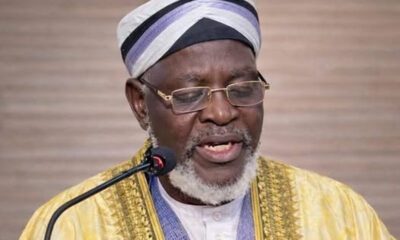
 metro2 days ago
metro2 days agoCourt Orders DIA to Produce Cleric Accused of Coup Plot by February 18
-

 metro1 day ago
metro1 day agoWoman Arrested Over Murder of Nigerian E-Hailing Driver in South Africa
-

 News3 days ago
News3 days agoMPAC Hails Supreme Court Verdict Affirming Muslim Students’ Right to Worship at RSU



